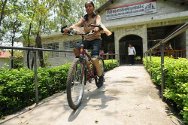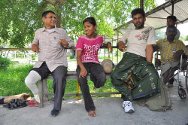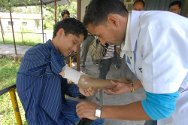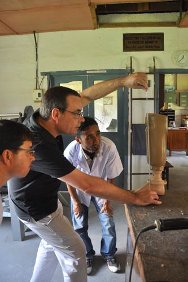Nepal: learning to walk again
24-06-2011 Feature
Although the ten-year armed conflict in Nepal came to and end in 2006, explosive remnants of war continue to kill and maim civilians. The ICRC is working to assist those who fall victim to such devices and to prevent injuries through an awareness campaign.
Landmines and improvised explosive devices affect people in 70 of the 75 districts of Nepal. The threat is especially high in rural areas, where people farming the land or children playing in fields stumble upon them and are injured. Among many stories of people being badly injured by such devices, that of Tulasi Pariyar shows what is being achieved by the ICRC and the Nepal Red Cross Society (NRCS).
“I landed with a thud”
Eleven-year-old Tulasi always enjoyed playing outside with her friends. One day, chasing after a goat, she followed it through the perimeter fence of an army barracks. "There was a huge blast that threw me high up into the air through the trees," she says, raising her little hands to gesture before adding, "I landed with a thud on the ground." She had stepped on a landmine that exploded. She vaguely remembers her brother carrying her to the nearest hospital about two hours away from their village in Kapilvastu district in the rural western part of Nepal.
Tulasi spent four months in hospital. Her left leg was seriously injured and the doctors had to amputate. She underwent four further operations to save her right leg. Whilst in hospital, Tulasi recalls the anguish that she underwent from losing her leg. She recounts strange dreams in which her leg would start growing, the wound would heal, the scar would vanish and she would be able to walk again.
Before the accident Tulasi was an enthusiastic student and playful girl. Afterwards she was restricted to staying indoors and had difficulty walking with crutches and moving without help. The simple act of stepping on a landmine had changed her life, seemingly irreparably.
Walking again
Now 15, Tulasi is walking again thanks to a prosthetic limb which was fitted three years ago at Green Pastures Hospital and Rehabilitation Centre in Pokhara. Once again, Tulasi can ride a bicycle and play outside with her friends. The Green Pastures Hospital provides physical rehabilitation services for people who have lost limbs or injured spinal cords, enabling them to resume their lives and regain their independence to work and reintegrate into family and community activities.
The ICRC, in cooperation with the International Nepal Fellowship, started supporting the Green Pastures Hospital in 2004. The hospital’s physical rehabilitation centre receives support in the form of training, financial assistance, supplies, equipment and the materials necessary for fabricating artificial limbs.
Tulasi is one of more than 150 conflict-related victims with irreversible disability who will need follow-up services throughout their lives. Like other patients, her prosthetic limb requires regular adjustment and needs replacing every three years as she grows. To assist people like Tulasi, the ICRC works closely with the NRCS’s District Chapters, following up on registered patients and identifying those with disabilities and in need of physical rehabilitation.
Training for the future
In order to provide these services to more people, in 2009 the ICRC extended its support to the Yerahity Rehabilitation Centre run by the Nepal Army in Kathmandu, to which civilian patients can now be referred. The head of the centre is Brigadier General Dr Bachchuram. Dr Bachchuram closely follows each case referred to the centre and has contributed to the rehabilitation of scores of people.
“To be able to come back to terms with life and evoke the spirit of fighting back is a very demanding task, and that is the core idea of the rehabilitation programme," he explains, expressing the struggle that patients must overcome.
To ensure sustainability of the rehabilitation programmes, the ICRC sponsors Nepali students to attend a formal three-year training course at the Cambodian School of Prosthetics and Orthotics in Phnom Penh. To enrich the training experience, the institution(ICRC) organizes clinical placement for the ortho technicians in ICRC supported rehabilitation centers in Cambodia.
Dhan Prasad Nepali, 43, is one of four students presently training in Cambodia. He will be Nepal’s first orthopaedic technician when he graduates at the end of 2011. Dhan joined the Green Pastures Hospital 15 years ago when it was a leprosy hospital. At the time, he produced shoes for amputees who had lost limbs to the disease. "I used to make wonderful shoes,” he says, beaming with pride. “In fact, shoe-making is my ancestral profession."
In 2004, Dhan became an orthopaedic technician in Green Pastures Hospital. "My service to amputees helped me identify with their physical pain and mental suffering. I now know how difficult is it for them to move uphill or walk a long distance," he confides. His compassion for the patients motivated him to enrol in the Cambodian training course.
Improving community awareness
Tulasi regrets not having any knowledge about landmines at the time of her accident. Like many people in her village, she did not know the meaning of the ‘Danger’ signs placed at the forest entrance adjacent to the army barracks. Most victims of explosive remnants of war in Nepal are unaware of the dangers that these devices present.
To minimize the risk, the NRCS conducts community awareness sessions through its Mine Risk Education (MRE) programme in rural communities in some 60 districts in Nepal. NRCS volunteers who have training in this programme deliver awareness sessions regularly. The ICRC supports the training of these volunteers and provides logistics such as transportation.
Over the years, the MRE programme has borne many success stories, which are testament to the reduced number of casualties and injuries the programme has achieved, in addition to the identification of explosive devices and their removal by security forces. However, such are the ongoing risks from landmines and other anti-personnel devices that the NRCS team continues to run Emergency Mine Risk Education sessions for communities, with the aim of increasing awareness of the explosive remnants of war and preventing further injuries.



